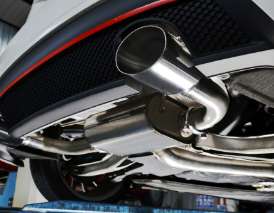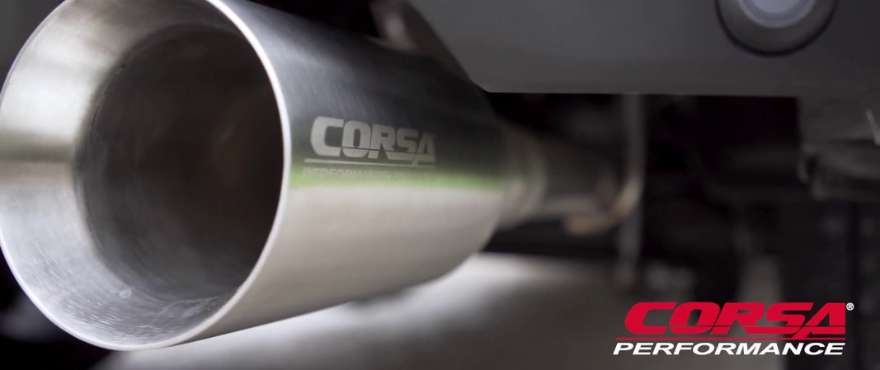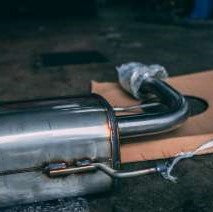The question "What is a muffler?" may seem simple, but a muffler's role in enhancing performance and reducing noise pollution is fairly complex. Mufflers are essential components of a vehicle's exhaust system, working behind the scenes to ensure a quieter, smoother and more efficient driving experience.
As enthusiasts and tuners continue to push the limits of their vehicles, upgrading to a performance muffler has become increasingly popular. These specially designed mufflers provide a distinct, powerful sound and boost engine output and overall performance. Read on to explore the ins and outs of these vital parts, from the purpose of a muffler and its functions to the different types of mufflers and the benefits of installing a high-quality aftermarket muffler upgrade.
Table of Contents

What Is a Muffler? What Does a Muffler Do?
A muffler, often considered the unsung hero of the exhaust system, is a device specifically engineered to reduce noise emitted by the engine. By mitigating the harsh, disruptive sounds produced during the combustion process, a muffler ensures a more comfortable driving experience for both the passengers and the surrounding environment.
What Is the Purpose of a Muffler?
Beyond noise reduction, the purpose of a muffler is to help maintain optimal backpressure levels within the exhaust system. This balance of pressure is essential for the efficient operation of the engine, as it aids in expelling exhaust gases and optimizing engine performance. In essence, a well-functioning muffler is vital to the overall health of your vehicle, making it an indispensable component in any exhaust system.
However, stock mufflers can work contrary to this principle and actually increase backpressure. A performance muffler will do a much better job, especially when combined with a resonator.
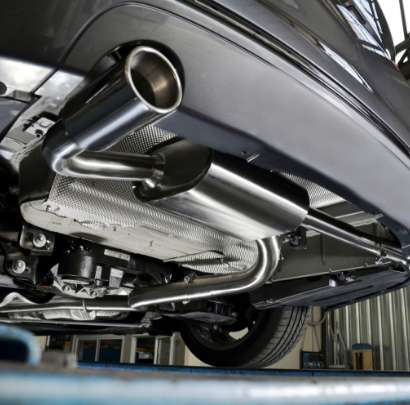
What Is the Point of an Aftermarket or Performance Muffler?
The point of an aftermarket or performance muffler is to provide benefits beyond those of a standard muffler. These specialized mufflers are designed to enhance vehicle performance and deliver a more aggressive, distinctive exhaust note. A performance muffler and resonator working in tandem can reduce backpressure and increase exhaust flow, improving horsepower and torque output. Moreover, aftermarket mufflers can give a vehicle a customized look and feel while supporting specific performance goals. Ultimately, aftermarket and performance mufflers cater to enthusiasts and tuners seeking to extract every ounce of potential from their vehicles while creating a unique auditory and aesthetic experience.
How Does a Muffler Work?
To appreciate the intricacies of a muffler, it's important to understand how it works to dampen noise produced by the engine. The process begins with sound waves generated during engine combustion. These sound waves travel through the exhaust system and eventually reach the muffler.
Inside a muffler is a series of chambers, tubes and perforations designed to manipulate the behavior of sound waves. As the sound waves enter the muffler, they are reflected, absorbed and canceled out through a process called destructive interference. The chambers and tubes are strategically arranged to create areas where sound waves of equal amplitude and opposite phase collide, effectively canceling each other out and reducing the overall noise output.
The ingenuity behind the muffler's design lies in its ability to minimize noise without impeding the flow of exhaust gases. By striking the right balance between noise reduction and exhaust flow, the muffler ensures that engine performance remains unhindered while providing a quieter and more pleasant driving experience. However, some performance enthusiasts find stock mufflers too restrictive, so many opt for an aftermarket muffler.
Take Your Vehicle to New Heights With a CORSA Performance Muffler
CORSA Performance specializes in top-tier aftermarket mufflers designed to balance noise reduction and engine optimization. Our CORSA Pro Series custom exhaust tips, mufflers, resonators and other exhaust parts are specifically engineered to cater to classic cars and modded V8s. Experience the difference of a No-Drone CORSA Performance muffler with Reflective Sound Cancellation® (RSC®) technology and join the ranks of car enthusiasts and tuners who trust our innovative and high-quality products.
Shop CORSA Pro Series Mufflers
Types of Mufflers
Selecting the right type of muffler depends on your specific needs and preferences. Below are some common types of mufflers — or terminology used to describe them.
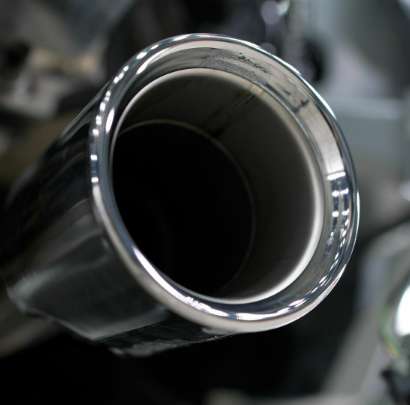
Performance Muffler
As mentioned, these are engineered to increase exhaust flow, thereby improving horsepower and torque while creating a deep, aggressive exhaust note. Their unique construction often involves straight-through designs that offer minimal resistance to exhaust gases.
Aftermarket Muffler
Any muffler not from the original equipment manufacturer is considered "aftermarket." Often designed as a replacement or upgrade to the factory-installed muffler, these come in a variety of sound profiles, from subtle and quiet to loud and aggressive.
Turbo Muffler
Turbo mufflers feature a series of perforated tubes that guide exhaust gases. These tubes create an S-shaped path, reducing noise without significantly restricting exhaust flow. Turbo mufflers are known for their moderate tone and improved engine performance.
Chambered Muffler
These mufflers use a series of chambers of different sizes to reduce exhaust noise. As sound waves pass through these chambers, they bounce off the walls, causing cancellation and resulting in a quieter exhaust note.
Glasspack Muffler
This type of straight-through muffler is named for the fiberglass packing it uses to absorb sound. These mufflers are known for their distinctive, aggressive sound, but they're not noisy enough to bother those around you. Glasspacks are a favorite among those seeking a vintage or hot-rod style exhaust note.
Straight-Through Muffler
Straight-through mufflers feature a simple design with a perforated tube wrapped in sound-absorbing material, like the glasspack, but their shape can be round or chambered. The straight-through path offers minimal resistance to exhaust gases, improving performance in most areas.
Whether you prioritize performance enhancements, sound modifications or aesthetic upgrades, there's a muffler type designed to meet your goals. Always remember that the ideal muffler aligns with your vehicle's specifications and expectations.
Materials Used in Mufflers
The material of a muffler plays a crucial role in its performance, durability and overall sound characteristics. Two common materials used in the construction of mufflers are steel and aluminum.
- Steel: Known for durability and heat resistance, steel is a common choice for muffler construction. High-quality 304 stainless steel, in particular, is often favored for its superior corrosion resistance. CORSA Performance uses premium-grade 304 stainless steel for our mufflers to ensure top-tier performance and enduring resilience.
- Aluminum: Lightweight and cost-effective, aluminum is another material often used in mufflers. While it may not have the heat resistance or durability of stainless steel, aluminum mufflers can still be a viable choice for vehicles under normal driving conditions.
Check out this video for a closer look at the materials and construction of our Pro Series CORSA Performance mufflers.
How to Install a New Aftermarket Muffler
Installing a new performance muffler can be a rewarding DIY project for those with the right tools and a basic understanding of vehicle mechanics. Here's a brief overview of the process:
- Safety First: Ensure your vehicle is securely positioned on level ground. Use jack stands or ramps to lift it safely.
- Removal: Disconnect the old muffler from the exhaust system. This usually involves unscrewing and loosening the clamps and hangers that secure the muffler in place.
- Inspection: Check the exhaust valves for signs of damage or excessive rust. Repair or replace any damaged components before installing the new muffler.
- Installation: Attach the new muffler using new clamps and hangers. Ensure it's securely fastened and properly aligned with the rest of the exhaust system.
- Check: Start your vehicle and listen for any unusual noises. Check for leaks around the newly installed muffler.
Please note, while this provides a basic guideline, the process can vary depending on the vehicle's make, model and the type of muffler being installed. If you experience complex installations or are unsure about the process, it's always best to consult a professional.
Rev Up Your Ride With CORSA Performance Mufflers
Understanding what a muffler is and how it works, along with the types of mufflers, the purpose of a muffler upgrade and the signs you need a new one, is critical to maintaining your vehicle's performance and ensuring a pleasant driving experience. Whether you're aiming for an aggressive exhaust note or seeking a performance boost, a muffler upgrade can make a significant difference. CORSA Performance offers a range of high-quality muffler upgrade exhausts designed to meet your specific needs. Don't compromise on your vehicle's potential; choose a CORSA Performance muffler and experience the ultimate combination of performance, sound and endurance. Make your next journey remarkable with CORSA Performance.


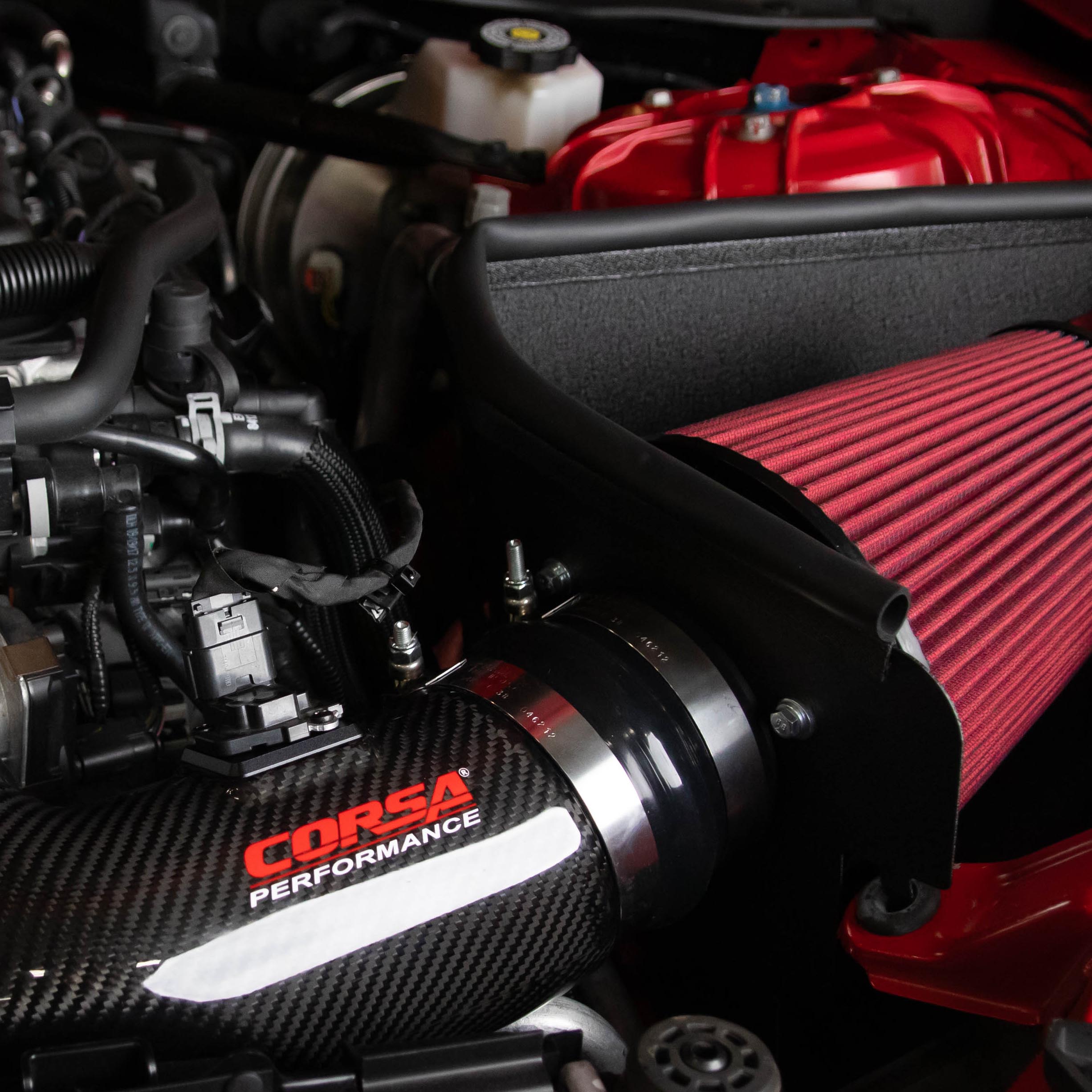
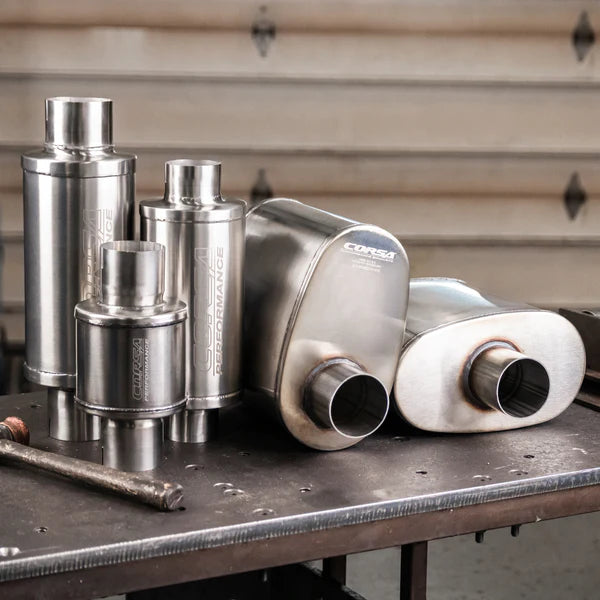


![[OPEN BOX ITEM] 3.0 in Downpipe | 2015-23 Ford Mustang EcoBoost 2.3T (14344)](http://www.corsaperformance.com/cdn/shop/files/14344-2015-2019-ford-mustang-ecoboost-downpipe-3-0-sport-to-xtreme-14344-downpipe-745179021328_63440e1a-d143-4f51-9a01-bbec5072ab45.jpg?v=1688997809&width=104)





![[OBSOLETE] Shielded Box Air Intake | 2011-2015 Cadillac CTS-V 6.2L V8 (415864)](http://www.corsaperformance.com/cdn/shop/products/415864-2011-2015-cadillac-cts-v-6-2l-v8-pro5-air-intake-415864-air-intake-2589524787314.jpg?v=1621866859&width=104)

![Pro Series Muffler (3.0" and 2.5") [MULTIPLE CONFIGURATIONS]](http://www.corsaperformance.com/cdn/shop/products/CP30CTR_lowres_1.jpg?v=1692361215&width=104)








![[CLOSE OUT] Black / CORSA Men's T-Shirt | Exhaust Tips](http://www.corsaperformance.com/cdn/shop/products/IMG_0485_edit_square.jpg?v=1709830722&width=104)


![[CLOSE OUT] Varsity / CORSA Women's Full Zip](http://www.corsaperformance.com/cdn/shop/products/IMG_0456_edit6copy_square.jpg?v=1628686742&width=104)


